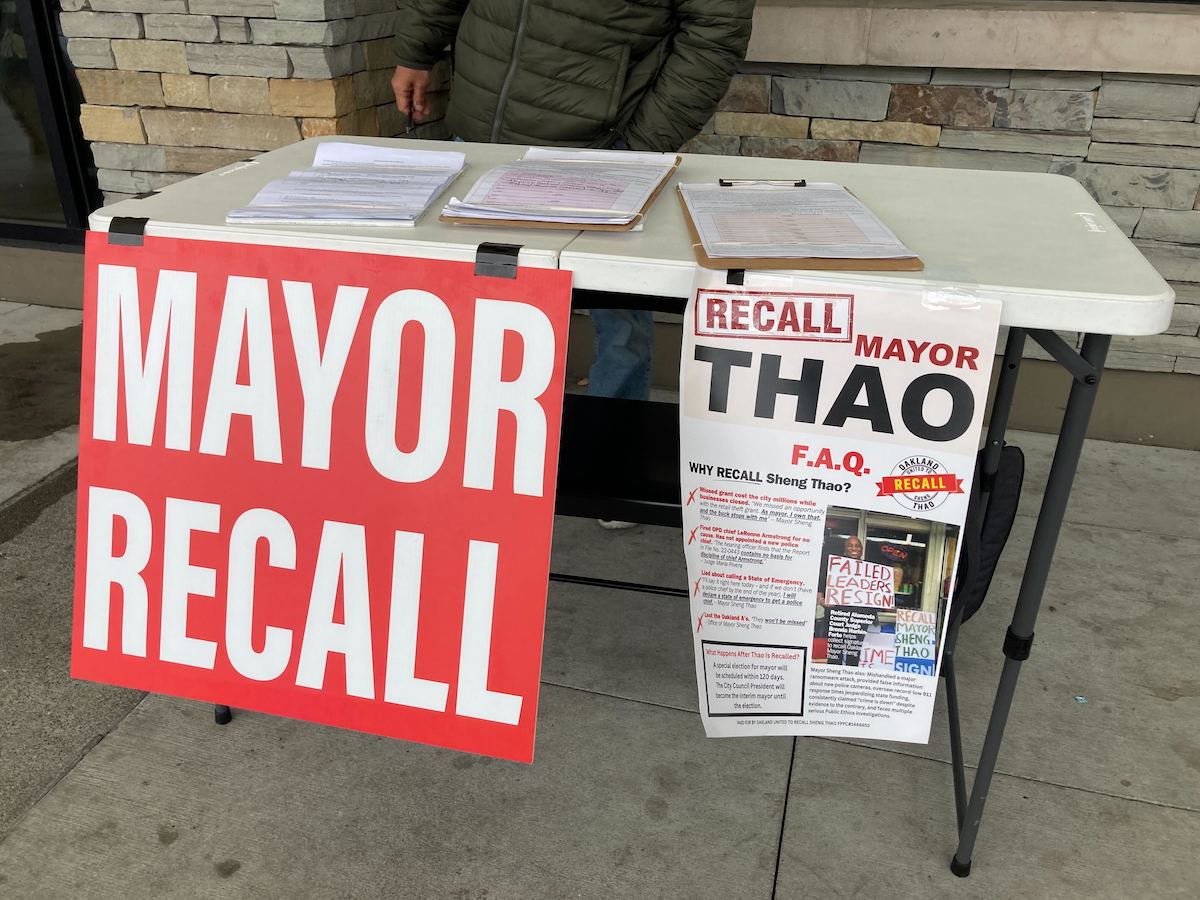Oakland’s political watchdog agency filed a lawsuit last week against organizers of the recall campaign targeting Mayor Sheng Thao. The lawsuit alleges that the recall’s backers have refused to hand over fundraising records sought by the Public Ethics Commission, which is looking into allegations the recall supporters violated campaign finance laws.
The legal action follows attempts in May by the city’s Public Ethics Commission to subpoena the campaign committee running the recall, Oakland United to Recall Sheng Thao, and a related group, Foundational Oakland Unites.
Investigators say the organizers behind the recall campaign may have violated Oakland’s Campaign Reform Act in order to “circumvent various restrictions requiring disclosure of the source and amount of campaign donations,” according to the lawsuit.
Details about active ethics cases rarely get aired in public. But when people refuse to cooperate with subpoenas, investigators are forced to ask a court to intervene. In the recall campaign’s case, investigators filed several lengthy documents describing the allegations they’re examining.
Simon Russell, the PEC’s chief of enforcement, wrote that public records currently available to his team show “a pattern which suggests that OUST solicited contributions to itself via Oakland United and that Oakland United raised money with the purpose of contributing it to OUST. OUST did not report any earmarked contributions,” when it filed disclosure forms earlier this year. “OUST did not report them as earmarked or otherwise state who the original contributors to Oakland United were.”
If true, these maneuvers could have obscured the recall campaign’s true sources of funding. However, the PEC hasn’t proven its case, which is still in its early stages. The recall campaign may have done nothing wrong.
The recall’s leaders, Brenda Harbin-Forte and Seneca Scott, did not respond to an interview request.
Todd Pickles, an attorney representing the recall campaign committee, also did not respond to questions from The Oaklandside.
Pickles has objected to the PEC’s subpoenas in two letters. In one letter, sent May 28, Pickles told the PEC’s Russell that the recall campaign is objecting to the subpoenas because they demanded records within eight days, an “unreasonable” amount of time. One of the people named in the subpoena who was asked to produce records, Rebecca Olson, is the attorney for the recall campaign and Foundational Oakland Unites. Pickles wrote that these records are protected by attorney-client privilege. He also wrote that the subpoenas infringe on the privacy rights of recall organizers.
Pickles also accused the PEC of engaging in a politically motivated investigation. “The subpoenas are being used for an improper political purpose,” he claimed, adding that he believes the Public Ethics Commission has “close ties” to the mayor’s office and therefore has a conflict of interest.
Members of the Public Ethics Commission are not appointed by the mayor. Ryan Micik, the commission’s current chair, was appointed by previous members of the commission, and the vice chair, Francis Upton, was appointed by the city auditor. The commission’s investigators are career civil servants, not political appointees.
The recall campaign launched in January. Brenda Harbin-Forte, a former Alameda County Superior Court judge and police commissioner, has criticized Thao for the city’s public safety problems. She and other members of the recall have also blamed Thao for the struggles of local businesses, the departure of the A’s, the failure to secure a major grant to prevent retail theft, and the firing of former police chief LeRonne Armstrong.
In April, the recall campaign sent out an email to prospective donors that said, “We have options for donors to remain private if you prefer.” The letter included an email address for a consultant working for Foundational Oakland Unites.
At the end of April, Oakland United to Recall Sheng Thao disclosed that it had raised $61,646 from individuals between January and March. Nearly half of this money came from tech billionaire Ron Conway and two of his sons, Chris and Ronny.
The bulk of the campaign’s financial support came in the form of “non-monetary” contributions from Foundational Oakland Unites. Foundational spent $210,000 to pay for signature gathering to get the recall on the ballot. As of May, OUST owed Foundational another $25,000 for signature-gathering.

